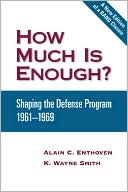

 |

|

The average rating for How Much Is Enough?: Shaping the Defense Program, 1961-1969 based on 2 reviews is 5 stars.
Review # 1 was written on 2013-02-10 00:00:00 Demarco Tiger Demarco TigerHow many times have I read this book. First for interest, second as a textbook, third when our new organization was setting up somewhat in the image of 1960 Systems Analysis. I was recently given another copy in a class run by IDA. The ideas and principles are first-rate, and I believe it codifies a way of thinking that most policy analyses should emulate. It is my bible for the reason that cost-effectiveness, not cost-benefit, analyses are key in national security. I also appreciate the clarity about the pitfalls, the opposition, and the limitations of this kind of national security analysis -- the fighter case is well done and shows why it never led to closure. Not sure I'll ever read it again, but I will always refer to it. |
Review # 2 was written on 2020-01-24 00:00:00 Gerald Huntley Gerald HuntleyAn account of United States Department of Defense budgeting in the 1960s may seem a rather esoteric item for a "must read" recommendation. Nevertheless, the 1960s were a controversial time, and the US Defense Secretary, Robert McNamara, was determined to apply rigorous standards to management. As key lieutenants in this process, Enthoven and Smith were deeply involved (but also were not neutral observers). This period saw the introduction of program budgeting and analytical approaches to decision-making. Anyone involved in public sector budgeting and management would do well to read the first two chapters - the principles and arguments are as relevent today as they were 50 - 60 years ago and the description feels incredibly modern. For anyone interested in recent history or contemporary politics, there are fascinating insights about the establishment of the United States as a superpower, the evolution of nuclear strategy, the role of NATO and the management of the Vietnam War. The McNamara era was marked by tension between the military and his civilian advisers. The authors, key civilian advisers, argue that the Defense Secretary cannot rely on military advice being unbiased, and he needs an independent source of civilian advice if he wants to make better decisions. This attitude is scattered throughout the book, but dealt with in Chapter 3 in particular. This caused me to suck on my teeth. I was a civilian manager working in the Australian Department of Defence. While some of this had elements of truth, it underplayed the importance of military expertise (military officers have a level of knowledge on how war is fought that cannot be easily picked up by the civilian analyst) and the attitudes promote a culture of confrontation rather cooperation (aggrevating the attitudes the authors complain about). |
CAN'T FIND WHAT YOU'RE LOOKING FOR? CLICK HERE!!!